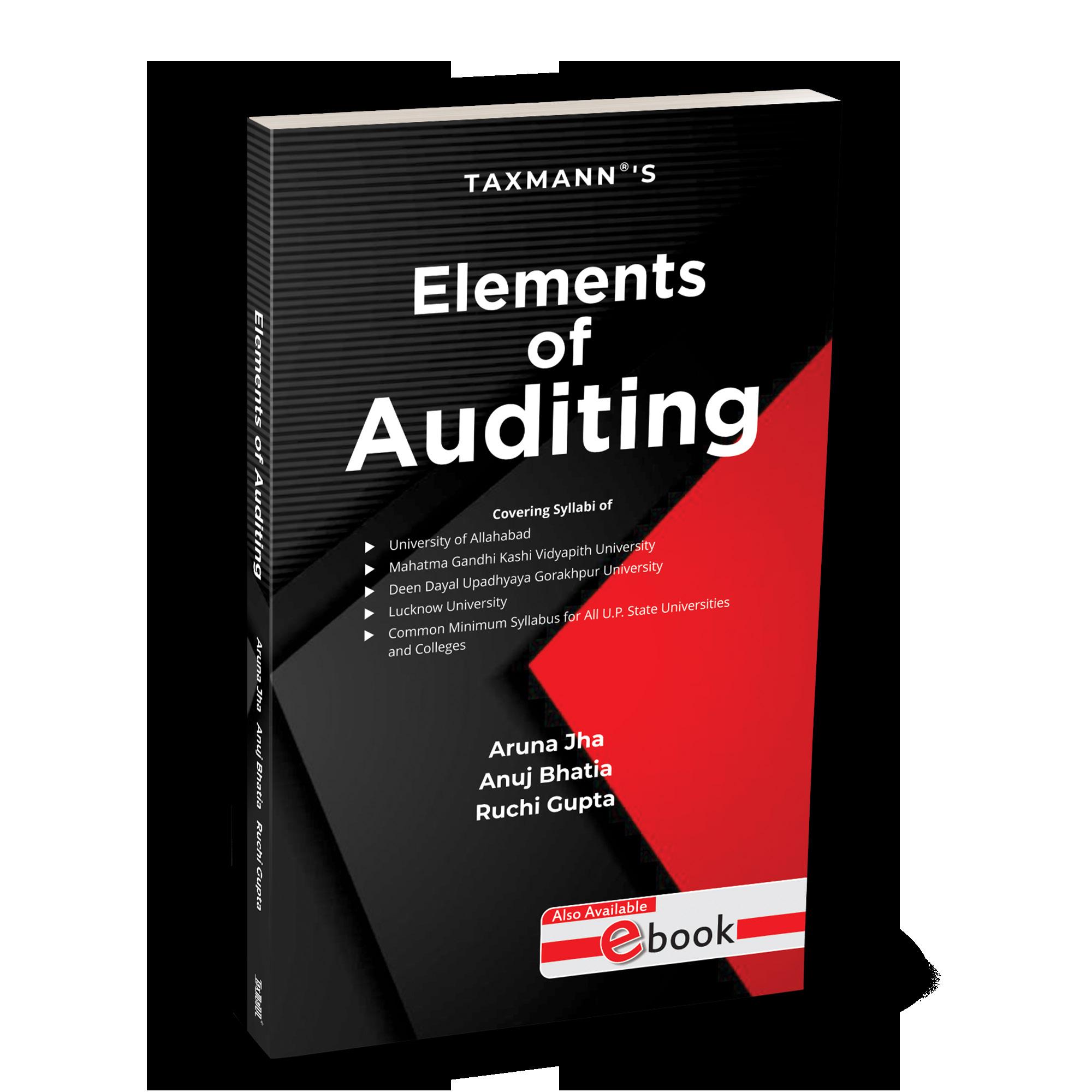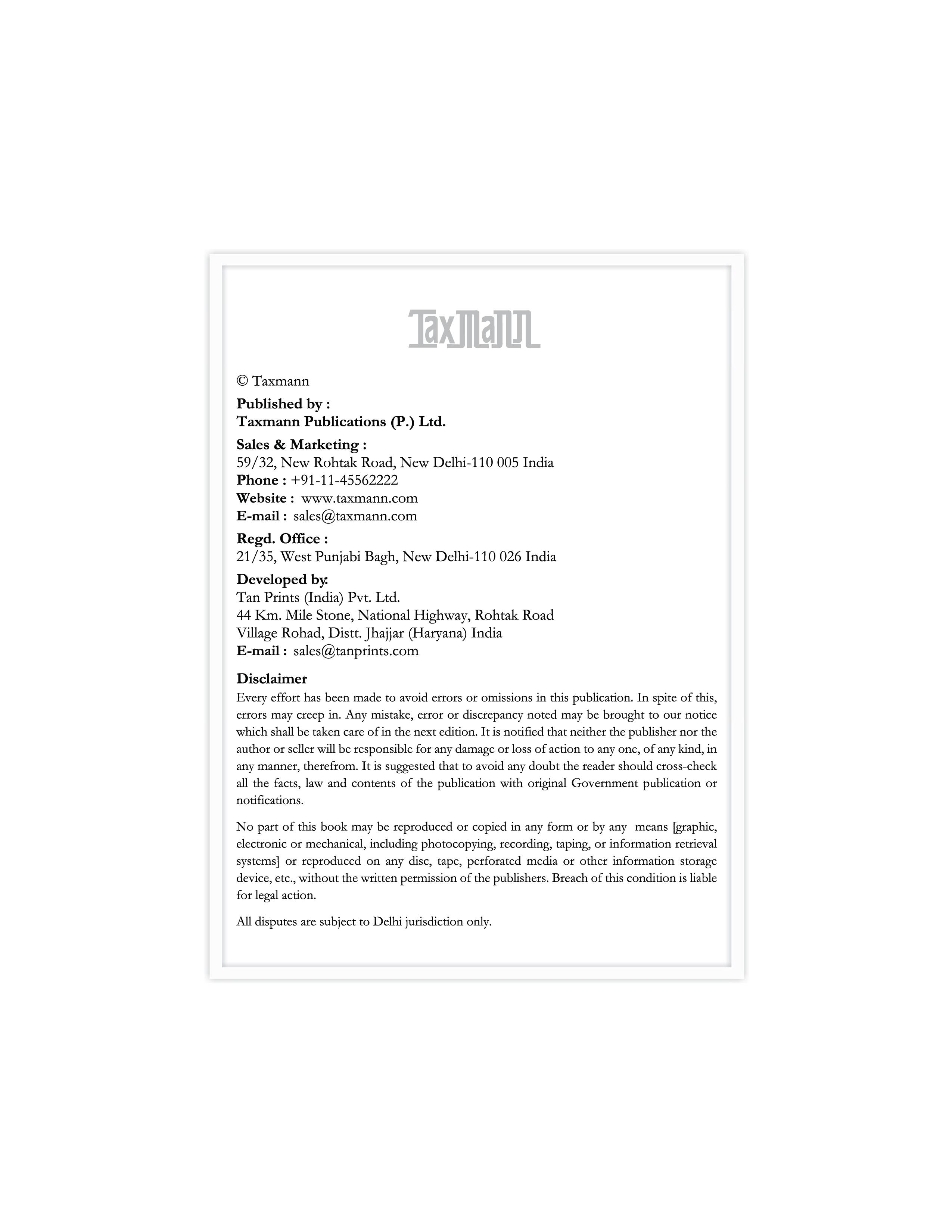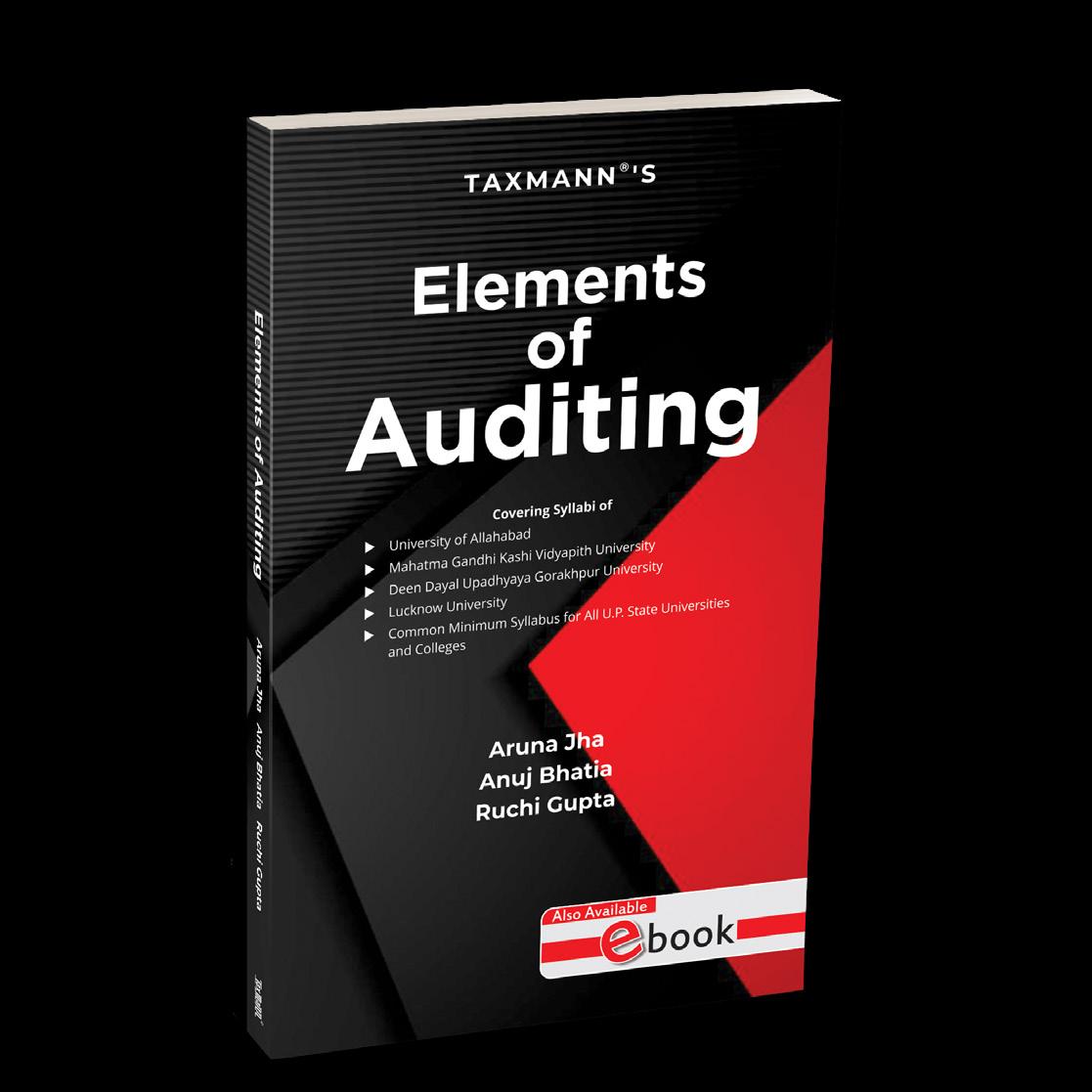Company Auditor: Appointment and Removal
8.1 ELIGIBILITY FOR APPOINTMENT OF AN AUDITOR
Section 141 of the Companies Act, 2013 (hereinafter referred to as the Act) lays down provisions regarding the eligibility of appointment of an auditor. These provisions are applicable to all types of companies, be it a private company, a public limited company, a Government company or a licensed company.
8.1-1 Auditor’s qualifications
The main purpose of section 141(1) and 141(2) of the Act is to ensure that only a qualified person possessing the requisite professional knowledge and technical skills is appointed as an auditor. The prescribed qualifications are :
In case of individuals
A rm of Chartered Accountants
LLP’s as auditors
A person who is a Chartered Accountant within the meaning of Chartered Accountants Act, 1949 and holds a certi cate of practice.
A partnership rm where majority of the partners practising in India are Chartered Accountants holding certi cate of practice, may also be appointed as an auditor of a company. In such a case, the appointment of an auditor may be made in the name of the rm and any partner may act in its name.
Limited Liability Partnership rm can be appointed as auditors of company but only Chartered Accountant partners are authorized to act and sign on behalf of rm.
8.1-2 Disqualifications of an auditor
The object of section 141 is to ensure independence of the auditor. Accordingly, none of the following persons shall be qualified for appointment as an auditor of a company :
(
a) Body corporate other than LLP; or
(
(
b) Of cer or employee of the company; or
c) Person who is a partner or who is in the employment of an of cer or employee of the company; or
(
(
(
(
(
(
(
(
d) Any person who has a business relationship with the company/its subsidiary/associate/its holding company/subsidiary or associate of its holding company (business relationship disquali cation); or
e) A person whose relative is a non-executive/executive director or key managerial personnel of the company; or
f) A person or his relative or partner is indebted to the company for an amount exceeding ` 5,00,000 or has given guarantee in connection with indebtedness of third person for an amount exceeding ` 1,00,000; or
g) A person or his relative or partner is holding any security in the company or its subsidiary; or
h) A person who has been convicted by a court of an offence involving fraud and a period of ten years has not elapsed from the date of such conviction; or
i) A person who is in full-time employment elsewhere; or
j) Any person whose appointment will result in the person being the auditor of more than 20 companies; or
k) Any person whose subsidiary or associate or any other form of entity is engaged in providing non-audit services as on the date of appointment (non-audit services disquali cations).
8.1-3 Automatic vacation on becoming disqualified
According to section 141(3), if an auditor after his appointment becomes disqualified on account of provisions of this section, he shall be deemed to have vacated his office automatically. This would be treated as casual vacancy.
8.2 APPOINTMENT OF AUDITOR
Under section 139 of the Act detailed provisions regarding appointment of statutory auditor has been laid out. The provisions are applicable to unlisted company as well as listed company. Sub-section (5) to sub-section (8) of section 139 contains provision with regard to appointment of auditor of a Government company. Auditors can be rst auditors, subsequent auditors or auditors appointed to ll casual vacancy.
8.2-1 Appointment of Auditor of listed as well as company to which Companies (Audit and Auditors) Rules, 2014
The provisions have been summarised as below: Para
Type of Auditor
First auditorSection 139(6)
Unlisted company as well as listed company
To be appointed by board of directors within 30 days of registration of company by passing a valid resolution. Or
To be appointed by members at EGM, if board of directors fail to appoint.
The board shall inform the members of such failure and members shall make the appointment within 90 days of receipt of such information.
Tenure of rst auditor shall be from the date of appointment till the conclusion of rst AGM.
Subsequent auditors
Section 139(1) to Section 139(4)
Casual vacancySection 139(8)
Every company shall at the rst annual general meeting appoint an auditor.
The auditor so appointed by members shall hold of ce from the conclusion of that meeting till the conclusion of its sixth annual general meeting.
Compulsory rotation of auditors by listed companies and classes of companies to which the Companies (Audit and Auditors) Rules, 2014 apply.
The company shall intimate the auditor about his appointment.
The company shall obtain a written consent and a certi cate as to the ful lment of conditions laid under section 141 from the auditor.
The company shall le notice with the Registrar about appointment within 15 days of the meeting.
If caused due to resignation - The member shall ll it within three months of recommendation of board of directors at a general meeting.
If caused due to any other reason - The BOD shall ll such a vacancy within 30 days.
The tenure of auditorship would be till the conclusion of next AGM.
Mandatory rotation of auditor
(a) The Ministry of Corporate Affairs has noti ed the Companies (Audit and Auditors) Rules, 2014. According to these Rules, rotation of auditors has been made mandatory for: listed companies.
unlisted companies with a share capital of more than ` 10 crores,
all private companies with paid-up capital of ` 50 crores or more, and
Para 8.2 COMPANY AUDITOR: APPOINTMENT AND REMOVAL
all unlisted and private companies with public deposits of a minimum of ` 50 crores.
(
b) The mandatory rotation of auditor has been introduced both at individual level as well at the audit rm level.
(
c) If joint auditors have been appointed, the rotation of auditors may be done in such a manner that both or all of the joint auditors as the case may be, do not complete their term in the same year.
(
d) According to section 139(2) of the Act, none of the above stated companies can appoint or reappoint —
Individual auditor for not more than 1 term of 5 consecutive years.
Audit rm including Limited Liability Partnership (LLP) for not more than 2 terms of 5 consecutive years.
Cooling off period for rotated individual auditor is 5 years from the completion of the term i.e. if an individual auditor has completed 5 years of his original term, he shall not be eligible for reappointment in the same company for a period of ve years. For audit rm including LLP too cooling off period stands at ve years.
Common Partners Restriction
No audit rm having a common partner/s with the other audit rm, whose tenure has expired in a company immediately preceding the nancial year shall be appointed as auditor of the same company for a period of 5 years.
Role of Audit Committee in appointment of the auditor
If a Government or a non-Government company constitutes an Audit Committee as required under this Act, all appointments, including the lling of a casual vacancy of an auditor shall be made after taking into account recommendations of such Committee.
8.2-2 Appointment of auditor in case of Government companies (Section 139)
Type of Auditor
First auditorSection 139(7)
Government company
Appointment of rst auditor shall be made by CAG within 60 days of registration of the company. Or
If CAG fails to appoint then Board of such company shall appoint rst auditor within next 30 days.
Subsequent auditors - Section 139(5)
Casual vacancy - Section 139(8)
Or
If Board fails to appoint the rst auditor within given time then it shall inform members and members shall make the appointment of rst auditor within 60 days of information at an EGM.
Tenure of rst auditor shall be from the date of appointment till the conclusion of rst AGM.
Appointment of auditor shall be made by CAG within 180 days from the commencement of nancial year.
The Auditor shall hold of ce till the conclusion of AGM.
Casual vacancy shall be lled by CAG within 30 days.
If CAG fails to ll the vacancy within given time then BOD shall ll the vacancy within 30 days.
The tenure of auditorship would be till the conclusion of next AGM.
8.3 COMPULSORY REAPPOINTMENT
Ordinarily, an auditor appointed by whatsoever authority, is to be compulsorily re-appointed by passing a resolution at the annual general meeting. However, the retiring auditor shall not be re-appointed in the following cases [section 139(9)] :
(i) if he is not quali ed for reappointment; or
(ii) if he has given the company notice in writing about his unwillingness to be reappointed; or
(iii) if a special resolution has been passed at the meeting—
(a) appointing somebody other than him; or
(b) providing expressly that he shall not be reappointed; or
(iv) if the auditor on reappointment will violate the ceiling on the number of audit.
If at any AGM, no auditor is appointed or reappointed, the existing auditor shall continue to be the auditor of the company.
8.4 CEILING ON NUMBER OF AUDITS
Provisions of the Act: The auditor, who has been appointed or reappointed under section 139, has to comply with the ceiling on number of audits prescribed under section 141(3)(g).
Objective of the ceiling: The objective of such a ceiling is to prevent concentration of audits in few hands.
Para 8.5 COMPANY AUDITOR: APPOINTMENT AND REMOVAL
How is compliance ensured: Before such appointment or reappointment, a certi cate in writing is required to be obtained by the company from the auditor regarding compliance of such ceiling.
Ceiling in case of individuals: The speci ed number of audit stands at twenty. The limit of twenty companies includes public companies and private companies having paid up capital of ` 100 crore or more. It excludes the audits of—
(i) one person companies
(ii) dormant companies
(iii) small companies
(iv) private limited companies with less than ` 100 crores paid capital.
Ceiling in case of partnership rm - The ceiling is twenty companies per partner of the rm. Any partner who is in full time employment elsewhere is not to be taken into account while computing the ceiling of number of companies that the rm can audit.
8.5 REMUNERATION OF THE AUDITOR - SECTION 142
Who would x remuneration?
(i) In case of rst auditor appointed by the board of directorsBoard of Directors.
(ii) In case of auditors appointed by the shareholders in general meeting - Shareholders in the general meeting.
(iii) In case of auditors appointed by the CAG for Government company - Shareholders in the general meeting.
The general meeting may even delegate powers to x the remuneration to the board of directors.
Remuneration includes what?
(i) Fees to auditor.
(ii) Expenses, if any, incurred by the auditor in connection with the audit of the company.
(iii) Cost of any facility provided to the auditor.
Disclosure of the amount paid to the auditor should be as per requirement of Schedule III to the Companies Act, 2013.
8.6 REMOVAL OF AUDITOR
8.6-1 Removal of auditor from his office before the expiry of his term - Section 140(1)
Object: The purpose of this section is to make the removal of an independent and conscientious auditor dif cult.
Special resolution: The 2013 Act requires that removal of auditors before expiry of his term shall require special resolution and previous approval of the Central Government for the removal of auditor before the expiry of the term.
Rule of natural justice: The auditor shall be given a reasonable opportunity of being heard before being removed.
The Companies (Audit and Auditors) Rules, 2014: According to these Rules:
(a) The application to Central Government has to be made within 30 days of passing the board resolution.
(b) The company shall pass a special resolution in a general meeting within 60 days of receipt of approval of the Central Government.
8.6-2 Resignation of the auditor - Section 140(2) and (3)
Statement of purpose to be led:
(a) The auditor who has resigned from the company shall le within a period of 30 days from the date of resignation, a statement in the prescribed form with the company and the Registrar of Companies (RoC), indicating the reasons and other facts as may be relevant.
(b) In case of Government companies and Government owned or controlled by the Government, the auditor shall also le such statement with the CAG, indicating the reasons and other facts as may be relevant with regard to his resignation.
Contravention: If auditor does not le such statement as above, he shall be punishable with a ne of not less than ` 50,000 but which may extend to ` 2,00,000.
8.6-3 Appointment of an auditor in place of a retiring auditor - Section 140(4) and (5)
Procedure for appointment of a new auditor in place of a retiring auditor is as follows:
Special notice shall be required for a resolution at an annual general meeting except in case of listed companies when the term of auditor expires due to mandatory rotation. 107 REMOVAL OF AUDITOR
On receipt of notice of such a resolution, the company shall forthwith send a copy thereof to the retiring auditor.
Where notice is given of such a resolution and the retiring auditor makes representation in writing to the company (not exceeding a reasonable length) and requests its noti cation to members of the company, the company shall, unless the representation is received by it too late for it to do so,—
(
a) in any notice of the resolution given to members of the company, state the fact of the representation having been made;
(b) company is required to send a copy of the representation to every member and if copy of representation is not sent then a copy shall be led with Registrar; and
(
c) if a copy of the representation is not sent because it was received too late or because of the company’s default, the auditor may (without prejudice to his right to be heard orally) require that the representation shall be read out at the meeting.
If the Tribunal, on the application either of the company or of any other aggrieved person, is satis ed that the auditor is securing needless publicity of a defamatory matter, it can exempt the company from sending the copy of representations to the members or reading them out at the general meeting. At the AGM ordinary resolution is to be passed to appoint new auditor in place of retiring auditor.
8.6-4 Removal by Tribunal - Section 140(5)
If the Tribunal is of the view that the auditor of a company has committed/colluded in a fraud in relation to, the company or its directors or of cers, it may, by order, direct the company to change its auditors. This power can be exercised either (a) Suo motu or (b) on an application made to it by the Central Government or (c) by any person concerned. If the application is made by the Central Government and the Tribunal is satis ed that any change of the auditor is required, it shall within fteen days of receipt of such application, make an order that he shall not function as an auditor and the Central Government may appoint another auditor in his place.
An auditor, whether individual or rm, against whom nal order has been passed by the Tribunal under this section shall not be eligible to be appointed as an auditor of any company for a period of ve years from the date of passing of the order and the auditor shall also be liable for action under section 447. Para 8.6
8.7 RIGHTS/POWERS OF AN AUDITOR
There are various rights conferred upon the auditor by the Companies Act, 2013 (hereinafter referred to as the Act). The principal rights, except those in case of removal of the auditor, are mentioned below:
(
i) Right of access at all times to books of account and vouchers of the company
Section 143(1) confers upon the auditor right of access at all times to books of account and vouchers of the company, whether kept at the registered of ce of the company or elsewhere.
The auditor can exercise this right at all times which implies normal business hours on any working day.
(
(
ii) Right to obtain information and explanations
Section 143 empowers the auditor to call for any explanation or information from the employees and of cers including managing director and other directors of the company, which he thinks is relevant for the purpose of audit and proper discharge of his duties.
In case any information or explanation is not given to him, he should mention this fact in his audit report.
iii) Right of access to records of subsidiaries
Auditor of a company which is a holding company shall also have the right of access to the records of all its subsidiaries insofar as it relates to the consolidation of its nancial statements with that of its subsidiaries.
(iv) Right to sign audit reports, etc.
The person appointed as an auditor of the company shall sign the auditor’s report or sign or certify any document of the company.
(
v) Right to receive notice of and attend general meeting
Auditor has a right to receive notice of any general meeting.
He has a right to be heard at such meeting on any part of the business which concerns him as the auditor.
8.8 DUTIES OF AUDITOR - SECTION 143, SECTION 144, SECTION 145 AND SECTION 146
a. Compliance with audit standard
b. Duty to report fraud
Every auditor shall comply with auditing standard issued by ICAI. [143(9)]
Auditor shall report the material fraud to the Central Government within prescribed time and manner. The same shall not be construed as breach of duty.
COMPANY AUDITOR: APPOINTMENT AND REMOVAL
c. Duty not to render certain services
d. Duty to sign audit reports, etc. (section 145)
e. Duty to attend general meeting
f. Duty to report & Duty to enquire
According to section 144 of the Act, an auditor can render services as are approved by the BOD or the Audit Committee. He cannot render “consulting and specialized services”.
The auditor of the company (in case where auditor is a rm/ LLP with CA partners and non-CA partners, only CA partner) shall sign the auditor’s report or sign or certify any other document of the company in accordance with the provisions of sub-section (2) of section 141.
Under section 146, auditor has a duty to attend any general meeting either by himself or through his authorised representative who is quali ed to be an auditor.
To be discussed in next chapter.
TEST YOUR KNOWLEDGE
1. Describe the provisions of the Companies Act, 2013 with regard to quali cations and disquali cations of the audit.
2. Comment on the following—
(i) Compulsory re-appointment of an auditor.
(ii) Ceiling on number of audits.
(iii) Auditor has a right to remuneration.
3. Can a properly appointed auditor be removed before the expiry of his term? If so, explain in brief, the procedure of removal.
4. What are the legal provisions for appointment of a company auditor?
5. Write short note on - Powers of a company auditor.
6. What are the duties of an auditor of a limited company?









